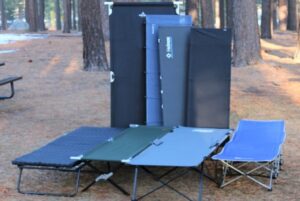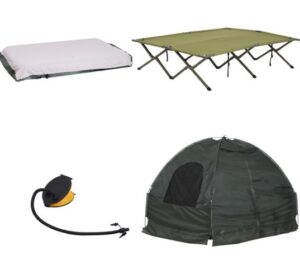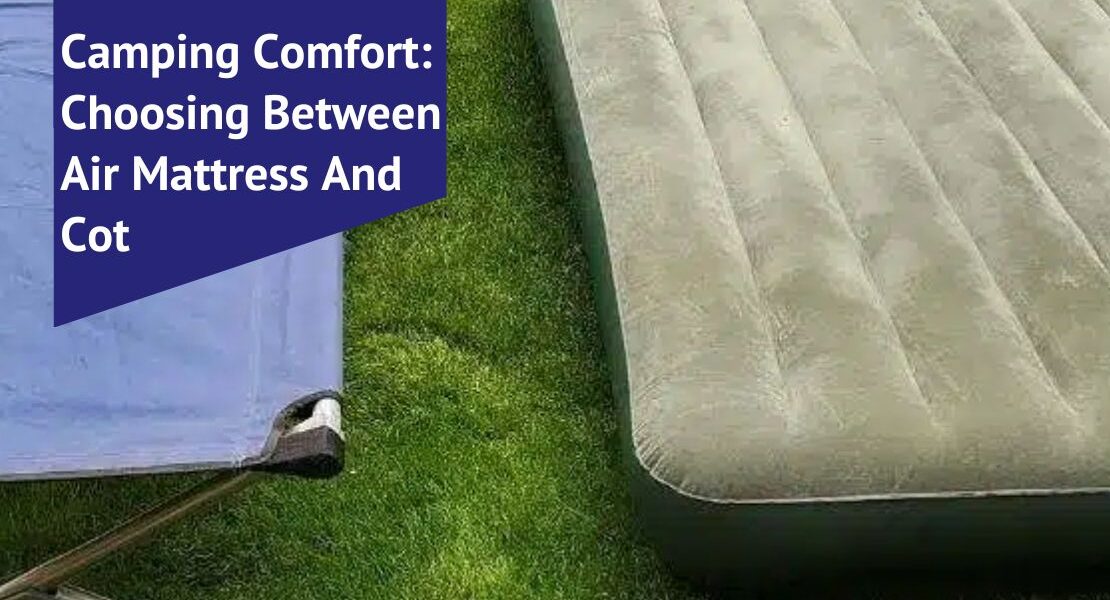Selecting the ideal sleeping arrangement for a camping trip often poses a dilemma. One important fact to consider is that a good night’s sleep can significantly enhance the outdoor experience.
This article will delve into the comparisons of air mattresses and cots, providing insights on comfort, durability, and convenience to aid in making an informed choice. Discover which option will ensure restful nights under the stars.
Table of Contents
Key Takeaways
- Air mattresses are lightweight, easy to pack, and comfortable due to their cushioning effect, but they might not insulate well from the cold ground without extra padding.
- Camping cots provide better insulation because they elevate you off the ground and offer more support and durability but can be heavier and bulkier for transport.
- Consider ease of setup: air mattresses can quickly inflate with a pump while camping cots unfold rapidly; however, both require some space in your camping gear.
- Cost-wise, air mattresses may be less expensive upfront but possibly need replacing more often; cots cost more initially but tend to last longer for frequent campers.
- Personal preference matters: some campers prefer the firmness of a cot while others like the softness of an air mattress – think about the comfort level desired when resting outdoors.
The Basics of Camping Cots and Air Mattresses
Camping cots and air mattresses are essential items for outdoor sleeping. They offer a comfortable way to rest after a long day of hiking or adventure. Each option has unique features and uses that cater to different camping needs.
Definition and uses
A camping cot is a sturdy, portable camp bed designed for outdoor use, such as tent camping, providing sleepers with an elevated surface off the ground. This structure offers better support and protects from the cold earth when temperatures drop at night.
Cots typically feature a solid metal frame wrapped in durable fabric and can often carry weight up to several hundred pounds. They are ideal for those who prioritize sleeping comfort and back support and offer additional storage space underneath.
On the other hand, air mattresses are inflatable beds made of lightweight materials like PVC or rubber-coated textiles. These beds can be easily rolled up for transport, making them highly suitable for campers who need to minimize their load while hiking to remote locations.
Air mattresses adapt to the shape of your body, which some people find more comfortable than cots’ rigid surfaces. Whether used inside a spacious tent or under the stars, they accommodate various sleeping preferences and amplify outdoor sleeping comfort by cushioning against rough terrain.
Key features and differences
Camping cots bring the comfort of elevation, keeping sleepers off the cold ground and providing a firmer sleeping surface. They are built for durability with a solid structure, capable of supporting more weight and lasting longer under rough outdoor conditions. Thus, you can choose them for your next camping trip.
With an average weight between 15 to 20 pounds, they stand up well against frequent use and can offer additional storage space beneath.
In contrast, air mattresses boast superior portability due to their lighter composition. These inflatable beds or inflatable mattresses fit easily into camping gear when deflated, making them ideal for those prioritizing ease of transportation on hikes or outdoor adventures.
While often comfortable, they sit directly on the ground, which may not be as warm during colder nights. Their flexibility allows users to adjust firmness according to their sleeping preferences but does require careful handling as they are more prone to punctures than cots.
Is a cot or air mattress better for camping?
When choosing between a cot or air mattress for camping, it’s essential to consider factors such as comfort, setup ease, insulation, portability, and cost. Each option has advantages and drawbacks, so understanding your specific camping needs will help determine the best fit for you.

What is the most comfortable sleeping for camping?
Determining the most comfortable sleeping option for camping hinges on several personal preferences and the nature of your outdoor adventure. Some campers swear by the comfort of camping cots, with their sturdy elevation offering an experience akin to a bed at home while keeping you off the ground and away from potential cold or dampness.
These durable platforms can enhance sleep quality, support your body well, and even offer storage space underneath for gear.
Others find that air mattresses hit the sweet spot for outdoor slumber. This is why air mattresses are considered one of the most comfortable options. They’re lighter than cots, which is a significant advantage if you need to minimize load during transport or have limited storage in your vehicle.
Air mattresses conform to your body shape and move easily inside tents; however, they require inflation and may not provide as much insulation from ground temperatures without additional padding.
The choice comes down to individual preferences—be it firmer support and elevation offered by cots or the cushioned flexibility of air mattresses. Thus, ensure that you consider comfort before you choose the best mattress for having a comfortable camping sleep. Also, keep the firmness of an air mattress and cot in mind before you select the best one.

Ease of setup and use
For homeowners looking for the most comfortable sleeping option for camping, ease of setup and use are essential factors to consider. Ease of use is a top priority when setting up camping cots and air mattresses. Here are the detailed points to consider:
- Camping cots typically involve a straightforward setup process, often requiring no more than unfolding the frame and attaching the fabric’s sleeping surface.
- Air mattresses are also generally easy to set up, usually involving inflation through an included pump or a separate air pump.
- Both camping cots and air mattresses can be conveniently packed away and transported with relative ease, making them practical choices for outdoor sleeping solutions.
- Homeowners may find that camping cots offer an advantage in stability once set up, providing a solid and sturdy base for sleeping compared to air mattresses that may require some adjustment for optimal comfort.
- On the other hand, air mattresses provide flexibility in terms of adjusting firmness levels using the inflation feature, catering to individual preferences for comfort.
- Consideration should also be given to the portability of each option, with air mattresses being lighter and more compact when deflated. At the same time, camping cots offer storage space underneath but are bulkier to transport.
 Image source – outdoorgearlab
Image source – outdoorgearlab
Insulation and warmth
Insulation and warmth are crucial when choosing between a camping cot and an air mattress. When it comes to insulation, camping cots offer better heat retention than air mattresses due to their elevated design, which keeps sleepers off the cold ground.
This elevation provides a barrier against low temperatures and ensures a warmer night’s sleep during chilly outdoor adventures. Additionally, using a thermal pad or sleeping bag with a camping cot can enhance insulation and warmth, making it an ideal choice for homeowners seeking comfort during colder camping trips.
The key lies in understanding the importance of temperature regulation while outdoors. With proper insulation from the ground, campers can enjoy restful nights regardless of fluctuating outdoor temperatures.
For homeowners interested in balancing both comfort and practicality, considering these aspects will guide them toward selecting the most suitable option for their camping needs.

Portability and packability
When it comes to portability and packability, air mattresses have the upper hand. They are lightweight and can be easily deflated and rolled up, making them convenient for transportation on camping trips.
Air mattresses also take up less space when packed, allowing homeowners to optimize their storage capacity for other essential camping gear.
On the other hand, while camping cots offer durability and elevation off the ground, they are bulkier and heavier than air mattresses. This makes them less portable and challenging to transport, especially for campers who need to hike or carry their gear long distances.
Cost
When considering the cost of camping cots and air mattresses, it’s essential to weigh the upfront investment against long-term durability and comfort. While camping cots tend to have a higher initial cost, they offer superior longevity and sturdiness.
On the other hand, air mattresses are more budget-friendly at first purchase but may require more frequent replacement due to wear and tear. Homeowners looking for a sustainable outdoor sleeping solution should consider investing in a durable camping cot that offers lasting value over time.
Additionally, homeowners on a tight budget or those seeking temporary sleeping options for occasional use may find air mattresses practical and affordable. With these factors in mind, individuals can make informed decisions based on their specific needs, preferences, and financial considerations when choosing between camping cots and air mattresses for their outdoor adventures.
These points will help you answer your question of whether ‘Are cots better for camping?’ Or ‘Are air mattresses better?’
Pros and Cons of Camping Cots and Air Mattresses
Camping cots provide elevation from the ground for better insulation and airflow, but they can be bulky and hard to transport. Air mattresses offer easy setup and lightweight portability, but they may require more effort to inflate and can be less durable than cots.
Pros of camping cots
Camping cots provide durability, offering a long-lasting sleeping solution for outdoor adventures. They offer ease of setup, allowing homeowners to prepare their sleeping arrangements quickly. Additionally, camping cots elevate sleepers off the ground, providing better insulation and protection from cold surfaces. Here are the key advantages of camping cots:
- Solid Structure: Camping cots boast a durable and sturdy frame, ensuring a stable and reliable sleeping surface.
- Elevated Sleeping Position: A cot raises sleepers off the ground, providing added comfort and protection from moisture and uneven terrain.
- Storage Space Beneath: Many camping cots feature storage pockets or space underneath, allowing homeowners to stow away personal items conveniently.
- Improved Support: Cots offer excellent support for the back and body, ensuring a comfortable rest during outdoor excursions.
- Longevity: Compared to air mattresses, camping cots are more resistant to punctures and tears, providing a longer lifespan for repeated use in outdoor settings.
- Easier Mobility: Cots can be easily moved around the campsite, providing flexibility in optimizing sleep positions within the tent or outdoors.
- Weather Adaptability: The elevated design of camping cots makes them suitable for various weather conditions by keeping users insulated from cold or wet ground surfaces.
Cons of camping cots
Camping cots have several drawbacks that homeowners should consider before making a decision:
- Camping cots can be heavier and bulkier to transport than air mattresses, making them less convenient for long hikes or backpacking trips.
- The rigid structure of camping cots may not provide the same level of cushioned comfort as air mattresses, potentially leading to a less restful night’s sleep.
- Setting up and tearing down camping cots can be time-consuming and require more effort than air mattresses’ relatively quick inflation and deflation process.
- Due to their elevated design, camping cots may not be suitable for campers who prefer sleeping at ground level or have difficulty climbing in and out of bed.
Pros of air mattresses
Air mattresses are lighter, making them easier to transport for camping trips. They provide additional cushioning and insulation from the cold ground. Here are the pros of air mattresses, which will help you answer, ‘Should I use an air mattress for camping?’
- Easy to Inflate: Air mattresses can be easily inflated using a pump or even manually, allowing for quick setup at the campsite.
- Comfortable Sleeping Surface: They offer a comfortable and supportive sleeping surface, ensuring a good night’s rest during outdoor adventures.
- Versatile Use: Air mattresses can also serve as an extra sleeping arrangement for guests when you’re back home.
- Affordable Option: They are available at various prices, offering affordability without compromising quality.
Cons of air mattresses
Air mattresses may require frequent re-inflation during use, especially when exposed to temperature changes or due to small leaks. This can be inconvenient and disrupt sleep.
- Potential for punctures: Air mattresses are susceptible to punctures from sharp objects, leading to air leakage and deflation.
- Lack of insulation: Compared to camping cots, air mattresses provide less insulation from the ground, potentially leading to a colder sleeping experience in low temperatures.
- Stability issues: Some air mattresses may shift or move while sleeping, impacting overall comfort and support.
- Durability concerns: Due to their inflatable nature, air mattresses may be more susceptible to wear and tear over time than camping cots’ sturdier construction.
- Limited off-ground elevation: While air mattresses offer some elevation off the ground, they’re generally not as elevated as a camping cot, which could impact comfort and protection from moisture on the ground.
Conclusion: Which is Best for Your Camping Cot vs Air Mattress?
When it comes to camping comfort, choosing between an air mattress and a cot depends on individual preferences and specific camping needs. Consider the factors of durability, weight, setup ease, insulation, warmth, and overall comfort to determine which option best suits your outdoor sleeping requirements.
Both air mattresses and cots have advantages and disadvantages; therefore, it’s essential to weigh these carefully before deciding. Ultimately, choosing between an air mattress or cot for camping will depend on your priorities and the specifics of your upcoming outdoor adventure, such as car camping.
Thus, consider all these points when deciding ‘What is the most comfortable sleeping mattress for camping?’
Frequently Asked Questions – For Choosing A Camping Mattress Perfect For Your Needs
What are the benefits of using an air mattress for camping?
The best air mattress provides cushioning, insulation from the ground, and adjustable firmness for a comfortable sleep.
The best air mattress provides cushioning, insulation from the ground, and adjustable firmness for a comfortable sleep.
Cots offer elevated sleeping surfaces, firm support, and convenience in and out of bed while camping.
How easy is it to transport an air mattress compared to a cot when camping?
An air mattress can be deflated and packed smaller than a cot, making it easier to transport for camping trips.
Do I need additional accessories with an air mattress or cot for comfortable outdoor sleep?
While both options can be used as-is, adding a sleeping bag on top can enhance comfort and warmth during outdoor sleep.
Can I use an air mattress and a cot interchangeably for different camping scenarios?
Yes, depending on your preference and the specific conditions of your campsite, either option can provide comfortable sleep outdoors.

 Image source - paddleabout
Image source - paddleabout 




